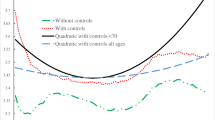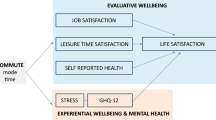Abstract
Are migrants satisfied with their decision to move to another country? Research shows that the income-wellbeing relationship is weak in wealthy countries, usually countries of destination. Are then economic migrants mistaken? Employing data from the Gallup World Poll, a representative sample of the world population, we investigate whether a general pattern of association exists between income and the cognitive component of subjective wellbeing, and whether this pattern differs by immigration status in 16 high-income countries. In only a handful of countries do we find a distinctive immigrant advantage in translating income into higher life evaluation or life satisfaction: Australia, Belgium, the Netherlands, Portugal and Sweden. For immigrants in most of these countries, income increases cognitive wellbeing even in the fifth income quintile. Depending on the measure used, immigrants in Canada, Denmark, Finland, Italy and the US only have positive income-wellbeing associations at or below the third quintile. We take this as evidence that, among recent arrivals, income is positively associated with wellbeing up to the point in which non-pecuniary factors associated with long-term residence become dominant. We also find a number of “frustrated achievers” among the foreign born in the US, France and Finland. These immigrants report a negative association, in absolute value, between income and life satisfaction or life evaluation.






Similar content being viewed by others
Notes
The World Values Survey, conversely, included this question in 1995 but discontinued it until 2010, when it was brought back.
References
Amit, K. (2010). Determinants of life satisfaction among immigrants from western countries and from the FSU in Israel. Social Indicators Research, 96, 515–534.
Attanasio, O., & Browning, M. (1995). Consumption over the life cycle and over the business cycle. The American Economic Review, 85(5), 1118–1137.
Ball, R., & Chernova, K. (2008). Absolute income, relative income, and happiness. Social Indicators Research, 88(3), 497–529.
Baltatescu, S. (2007). Central and eastern Europeans migrants’ subjective quality of life. A comparative study. Journal of Identity and Migration Studies, 1, 67–81.
Bartram, D. (2011). Economic Migration and Happiness: Comparing Immigrants’ and Natives’ Happiness Gains From Income. Social Indicators Research, 103, 57–76.
Becchetti, L., & Rossetti, F. (2009). When money does not buy happiness: The case of “frustrated achievers”. The Journal of Socio-Economics, 38, 159–167.
Blanchflower, D., & Oswald, A. (2004). Well-being over time in Britain and the USA. Journal of Public Economics, 88, 1359–1386.
Borjas, G. (1994). The economics of immigration. Journal of Economic Literature, 32(4), 1667–1717.
Brickman, P., Coates, D., & Janoff-Bulman, R. (1978). Lottery winners and accident victims: is happiness relative? Journal of Personality and Social Psychology, 36(8), 917–927.
Brockmann, H., Delhey, J., Welzel, C., & Hao, Y. (2009). The China puzzle: Falling happiness in a rising economy. Journal of Happiness Studies, 10, 387–405.
Browning, M., & Crossley, T. (2001). The life-cycle model of consumption and saving. The Journal of Economic Perspectives, 15(3), 3–22.
Clark, A. E., Frijters, P., & Shields, M. A. (2008). Relative income, happiness, and utility: an explanation for the easterlin paradox and other puzzles. Journal of Economic Literature, 46, 95–144.
Constant, A., & Massey, D. (2003). Self-selection, earnings, and out-migration: a longitudinal study of immigrants to Germany. Journal of Population Economics, 16, 631–653.
Cramm, J. M., Møller, V., & Nieboer, A. P. (2010). Improving subjective well-being of the poor in the Eastern Cape. Journal of Health Psychology, 15(7), 1012–1019.
De Jong, G., Chamratrithirong, A., & Tran, Q. (2002). For better, for worse: Life satisfaction consequences of migration. International Migration Review, 36, 838–863.
Di Tella, R., Haisken-De New, J., MacCulloch, R. (2007). Happiness adaptation to income and to status in an individual panel. NBER Working Paper No. W13159.
Diener, E., & Biswas-Diener, R. (2002). Will moneyincrease subjective well-being? A literature review and guide to needed research. Social Indicators Research, 57, 119–169.
Diener, Ed., Suh, E. M., Smith, H. L., & Shao, L. (1995). National differences in reported subjective wellbeing: Why do they occur? Social Indicators Research, 34, 7–32.
Easterlin, R. A. (1974). Does economic growth improve the human lot? In P. A. David & M. W. Rede (Eds.), Nations and households in economic growth: Essays in honor of Moses Abramowitz (pp. 89–125). New York: Academic Press.
Easterlin, R. A. (2005). Diminishing marginal utility of income? Caveat emptor. Social Indicators Research, 70(3), 243–255.
Frey, B., & Stutzer, A. (2002). What can economists learn from happiness research? Journal of Economic Literature, 40(2), 402–435.
Gallup. (2012). Worldwide research methodology and codebook. Gallup: Gallup Inc.
Graham, C., & Pettinato, S. (2002). Frustrated achievers: Winners, losers, and subjective well-being in new market economies. Journal of Development Studies, 384(April), 100–140.
Hayo, B., & Seifert, W. (2003). Subjective economic well-being in Eastern Europe. Journal of Economic Psychology, 24, 329–348.
Heckman, J. (1979). Sample selection bias as a specification error. Econometrica, 47(1), 153–161.
Helliwell, J., Barrington-Leigh, C., Harris, A., et al. (2010). International evidence on the social context of well-being. In E. Diener, J. Helliwell, & D. Kahneman (Eds.), International Differences in Well-Being. New York: Oxford University Press.
Herrero, Juan., Fuente, Asur., & Gracia, Enrique. (2011). Covariates of subjective wellbeing among Latin American immigrants in Spain: The role of social integration in the community. Journal of Community Psychology, 39(7), 761–775.
Hugget, M. (1996). Wealth distribution in life-cycle economies. Journal of Monetary Economics, 38(3), 469–494.
Kahneman, D., & Deaton, A. (2010). High income improves evaluation of life but not emotional well-being. Proceedings of the National Academy of Science, 107(38), 16489–16493.
Knight, J., & Gunatilaka, R. (2010a). The rural-urban divide in China: Income but not happiness? Journal of Development Studies, 46(3), 506–534.
Knight, J., & Gunatilaka, R. (2010b). The Subjective Well-being of Rural–Urban Migrants in China. World Development, 38(1), 113–124.
Lane, R. (2000). The loss of happiness in market democracies. New Haven: Yale University Press.
Massey, D., & Akresh, I. (2006). Immigrant intentions and mobility in a global economy: The attitudes and behavior of recently arrived U.S. immigrants. Social Science Quarterly, 87, 954–971.
McMahon (2006) Happiness: A history. New York: Grove Press.
Neto, F. (1995). Predictors of satisfaction with life among second generation migrants. Social Indicators Research, 35(1), 93–116.
Ouweneel, P., & Veenhoven, R. (1991). Cross-national differences in happiness: Cultural bias or societal quality. In N. Bleichrodt & P. J. D. Drenth (Eds.), Contemporary issues in cross-cultural psychology. Amsterdam: Swets and Zeitlinger.
Palloni, A., & Arias, E. (2004). Paradox lost: Explaining the Hispanic adult mortality advantage. Demography, 41(3), 385–415.
Piore, M. J. (1979). Birds of Passage. Migrant Labor and Industrial Societies: Cambridge University Press.
Ratha, D., Mohapatra, S., & Ani, Silwal. (2010). Migration and Remittances Factbook 2011 (2nd ed.). Washington DC: World Bank.
Saarela, J., & Rooth, D.-O. (2012). Uncertainty and international return migration: some evidence from linked register data. Applied Economic Letters, 19, 1893–1897.
Sjaastad, L. A. (1962). The costs and returns to human migration. Journal of Political Economy, 70, 80–93.
U.S. Census Bureau. (2012). Statistical Abstract of the United States: 2012.
Author information
Authors and Affiliations
Corresponding author
Rights and permissions
About this article
Cite this article
Olgiati, A., Calvo, R. & Berkman, L. Are Migrants Going Up a Blind Alley? Economic Migration and Life Satisfaction around the World: Cross-National Evidence from Europe, North America and Australia. Soc Indic Res 114, 383–404 (2013). https://doi.org/10.1007/s11205-012-0151-4
Accepted:
Published:
Issue Date:
DOI: https://doi.org/10.1007/s11205-012-0151-4




